- Home
- Vicki Delany
The Cat of the Baskervilles Page 7
The Cat of the Baskervilles Read online
Page 7
“Good publicity for sure,” Jayne said.
Pat came into the kitchen, her star-shaped heels clattering on the ceramic tile. “Has Nigel been in here?”
“No. Not all day as far as I know,” Jayne said. “Is he lost?”
“I’ve ordered a van to take the cast to their hotels, and we’re ready to go. But I can’t find him.” She swore heartily.
“Perhaps he took a taxi earlier,” Jayne said.
“Gerald didn’t call one for him. I’m starting to get the impression that Nigel doesn’t do a thing, can’t do a thing, for himself.”
“He’s probably ashamed of fluffing his lines,” Fiona said. “So he snuck off without telling Gerald or anyone else.”
Pat looked doubtful.
“Where did you see him last?” I asked.
“I left him at the patio table. I was so furious I didn’t dare stay a minute longer.”
Jayne got to her feet. “I’ll check the library and the living room. Perhaps he . . . uh . . . dozed off in there.”
“Passed out more like it,” Pat said. “I’ll get Rebecca to search upstairs. He might have decided to go for a nap. Did you see anyone talking to him after I left him?”
Leslie Wilson. Who, I realized, also hadn’t been seen since. She hadn’t joined the volunteers in the kitchen for their snack. I put my teacup down. “I’ll have a look outside. Maybe he went for a stroll in the woods.”
Pat muttered a bad word and stomped out.
Jayne and I exchanged a look and headed in different directions.
The cast and crew, minus Sir Nigel, were milling impatiently in a group. “Leave him to find his own way back,” the iron-haired woman who’d been introduced as the wardrobe mistress said. “I’ve already lost most of a day on this nonsense.”
Renee was checking her phone. One of the male actors tapped his watch. “I’ll wait in the kitchen,” Eddie said. “Call me when we’re ready to go.” He gave me a wink as he passed me.
A handful of guests, unwilling to see the party end, lingered. The bar was closed, the patio table empty. The party tent, with its bare tables and pushed back chairs, looked sad and lonely. A few sea gulls hopped about on the ground in search of fallen crumbs.
I stood at the edge of the lawn, debating which way to go to start my search. Grant saw me and hurried over. “Everything okay, Gemma?”
“Hard as it is to believe, they appear to have lost Sir Nigel.”
He laughed. Then he read my face. “You’re not joking.”
I plunged into the woods to the right at a rapid clip, and Grant followed. The property was extensive, but it wasn’t exactly in a wilderness. The surrounding woods were tame and well-maintained. In the shelter of the pine trees, all was cool and quiet. “Nigel!” I called. “It’s time to leave. They’re also searching the house,” I said to Grant. “He’s probably fallen asleep on a couch or something.”
“Nigel!” Grant shouted. “Come out, come out wherever you are.” He dropped his voice. “I’m glad I caught you before you left, Gemma. Are you free for dinner tonight?”
“That would be nice,” I said. “After today, I need someone to cook for me. As long as it’s a late one—I just finished a couple of scones.”
He patted his flat belly. “I stuffed myself with scones, sandwiches, and cookies. Wow, they were good. I lucked out and got a table with a couple on a gluten-free diet. While they plucked the grapes and strawberries off the display, scooped the filling out of the fruit tarts, and pretended they weren’t at all desperate to dive into those sandwiches, I gorged.”
I laughed. “Gluten-free, afternoon tea is not.”
“And,” he said, “as an added bonus, they showed genuine interest in collecting rare books, and I gave them my card.”
We walked through the woods toward the sea, calling Nigel’s name. Frankly, if not for the fact that the last time I’d seen him he’d been confronted by Jayne’s mum, who seemed prepared to take no more nonsense (and what did she mean, hear a few truths?) from him, I wouldn’t have bothered with this search. Let his PA and the theater people deal with him.
I was dead tired, but before going home and putting my feet up (and now getting ready to go out to dinner), I still had to pop into the shop, check with Ashleigh on how the day had been, and go through the end-of-day routine.
The trees ended abruptly, and we stepped out of the woods onto a rocky cliff. The sparkling blue waters of the Atlantic Ocean spread before us.
“Beautiful spot,” Grant said. Below, waves crashed on the rocky beach.
“Sure is.” I was about to turn away when something caught my eye. A scrap of cloth, caught on the branches of a thin bush. A paisley cravat. Grant reached out to pluck it off the bush. “Isn’t this . . . ?”
I grabbed his hand. “Don’t touch.” A patch of grass had been pressed down, as though trodden on. A dying bush at the edge of the cliff was bent over, it’s branch half-broken. “Something happened here.”
“I don’t see anything,” he said.
Out of the corner of my eye, I caught a glimpse of another scrap of cloth lifted on the breeze. A torn piece of pink ruching was caught on the sharp thorn of a bush. I made no move toward it and didn’t point it out to Grant.
“Stay there. Don’t move.” I stepped carefully toward the edge of the cliff, watching where I put my feet. It hadn’t rained in a week, and the ground was dry, but the mark of a man’s shoe print was visible in the dirt, and tuffs of grass were compressed.
I stood at the edge of the cliff and looked down. The tide was coming in, and the surf was rough. The cliff wasn’t very high—they aren’t along this stretch of the coast—not more than twenty feet. Not high, but high enough. The rocky beach was only a couple of feet wide, and water crashed against a row of boulders.
A man lay on the beach below me. His face was pressed into the ground, and the incoming waves lapped at his head. He wore a seersucker suit, and he was not moving.
Chapter 5
Grant pulled out his phone. While I looked around for the best way of getting down to the beach, he calmly and efficiently told the 9-1-1 operator what we’d found.
“Go up to the house and meet them,” I said.
“We have to check on him. He might still be alive. There must be some way down.”
“I can do that,” I said. “You run for help.”
“I’m not leaving you here alone, Gemma.”
“Whoever did this, if anyone did, is long gone. Someone has to tell Rebecca Stanton and the others what’s going on and lead the emergency personnel here. We don’t want them crashing around in the woods, wasting time trying to find us.”
“You go up to the house then, and I’ll stay here. It looks as though he fell by accident, but that might not be the case. If someone . . . pushed him, you can’t be sure they’ve left.”
Actually, I could be sure. The woods were cleared of brush and undergrowth; trees in reach of freezing salty spray were too thin and scraggly to conceal a person. Sea gulls flew low over the beach, and a crow cawed at us from the top branches of the dying pine that had snagged the edges of cloth. Pink ruching that I’d last seen on the aprons made by Leslie Wilson for her volunteers. Otherwise, all was quiet. Nothing but Grant and me, and the body below, to attract the attention of the birds.
“Please, Grant,” I said. “Don’t argue. Time’s passing. The police will be arriving any moment and putting everyone into a panic.” I pulled my phone out of my trouser pocket and held it up. “I’ll keep this in hand in case I need to call.”
Doubt crossed his eyes, and for a moment, I thought he was going to argue. Instead he gave me one last look before turning and running into the woods.
I wanted to take some pictures of the scene, but I feared the police would want to check my phone. I studied my surroundings, trying to take it all in as quickly as I could. Then I snatched the ruching off the tree and stuffed it into my pocket along with my phone.
I was well aware that I h
ad interfered with a crime scene, and that that was a crime in itself.
Was it a crime scene? Perhaps not. Nigel might have gotten too close to the edge of the cliff and, in his drunken state, slipped and fallen. He might have done himself in, driven by shame at the botched performance. But until I found out who’d been wearing the torn apron, I’d keep that detail to myself.
I didn’t have time to examine the area around me. Among the dirt and rocks and a few dead leaves blown in on the wind, only the single print of a man’s shoe seemed significant. About thirty yards away, the cliff edge softened and sloped, rather than plunged, down to the beach. I ran toward it and picked my way carefully down, slipping and sliding on loose rocks, disturbing the ground and snapping small branches as I grabbed them for support. Nigel wasn’t moving, but the incoming tide was beginning to wash his face.
I dropped to my haunches beside him. I touched the side of his neck and felt nothing stir. I knew I shouldn’t move him, but with the water rising, I had no choice in case he clung to life. I turned him over.
His eyes were so blank, I knew immediately he was dead.
“Gemma Doyle!” Someone shouted my name. I got to my feet and yelled back. Grant’s head popped over the cliff edge first, followed by that of a man in uniform, as well as leftover party guests. I pointed to where I’d found access to the beach. The first uniformed officer on the scene was Officer Richter. He was overweight, underexercised, and had suffered a minor heart attack recently. I’d heard he was off sick and had hoped he’d slip gently into retirement. No such luck. I prepared myself to give chest compressions if he tried to get down that cliff, but wisely he stayed back while others clambered down.
Two paramedics reached me first, equipment bags thrown over their shoulders. “You’re too late,” I said.
“Still gotta try,” they replied and got to work. I left them to their task. It was impossible to tell if anyone had recently walked across these rocks or through the rapidly filling tidal pools. Not even a trace of my passing showed. As I scrambled back up, thankful that I’d worn trainers today rather than sandals or heels, I passed a young female officer climbing down. “You were the one who found him?” she asked me.
“Yes. I had to turn him over. His face would soon have been completely in the water.”
“The detectives will want to talk to you.” She continued on her way.
By the time I reached the top, Richter was stringing a line of yellow police tape from tree to tree, and telling the onlookers to keep back. This was a respectable group, so most of them did as they were told. The actors, including Eddie and Renee, stood together, whispering among themselves, while Rebecca pushed her way through the crowd. I didn’t see Gerald. “Nigel! Is it Nigel? Has something happened to Nigel?”
“I can’t say,” Richter told her. “Step away, please.” Rebecca did so, but Renee left Eddie and attempted to cross the tape. Richter grabbed her arm. “I said stay back.”
I hurried over. “Nigel’s had a . . . fall.” I kept my voice low, speaking only to the two women.
“Is he okay?” Rebecca asked.
I gave my head a slight shake. Renee groaned, and Rebecca visibly paled under her light tan and perfect makeup.
Jayne and her mum stood among the onlookers. Jayne’s face was curious, Leslie’s stricken. She was not wearing her apron. I headed toward them, intending to get the heck out of Dodge, but Richter shouted at me. “You! Doyle! Don’t move. The detectives are on their way. They’ll want to talk to you.”
I put my hand on my heart and swayed slightly. Grant wrapped an arm around me, and I gave him a weak smile, making sure my face was turned toward Richter so he could see my distress. “I . . . I,” I said.
“Let me take her up to the house,” Grant said. “She’s about to faint.”
“My orders are to keep the witnesses here,” Richter replied.
“We aren’t witnesses,” Grant said. “We didn’t see what happened.”
Richter hesitated. If he couldn’t make a decision, then I’d have to do it for him. I swayed once again. “She needs to sit down,” Grant said. “Either here or at the hospital. Your call, buddy.”
“Okay, take her to the house. But no farther.”
Grant half-carried me into the woods. Jayne and her mum hurried after us, and curious onlookers watched us go. From out on the lawn, I heard Pat cry, “Nigel! What’s happened to Nigel?” as she hurried across the grass toward the cliff.
As soon as the trees closed around us, I pulled myself out of Grant’s arms. I felt a slight tinge of regret at having to do so. It had felt very nice indeed to be there.
“Okay,” I said. “Nigel’s dead. It might have been an accident, but then again it might not have been. Leslie, you’re coming with me. Grant, stay here and find out what the police are saying, if anything.”
“You’re okay?” Leslie said. “You scared me there.”
“Scared me too,” Grant said. “That was all an act?”
“I don’t care to be involved in police investigations,” I said. “When I tell them what I have observed, they have a tendency not to believe me. It would appear as though I, once again, have no choice. If I have to wait for them, I prefer to do it in comfort. Jayne, stay with Grant.”
“Why?”
I didn’t answer. I headed toward the house, making sure Leslie followed. I hoped to have a few minutes in private to ask her about the apron ribbon. Leslie and all five of her volunteers, including Mrs. Franklin in her walker, had worn the same style of homemade apron, so the one that had snagged on a dead tree branch might not belong to Leslie. But as far as I knew, the last person seen with Nigel had been my best friend’s mother.
We weren’t fast enough. As we emerged from the woods, who did I see approaching but two West London PD detectives.
The only thing I hate more than police incompetence is police efficiency.
One of the approaching officers was Ryan Ashburton. When I think of Ryan and me the word that comes to mind is “toast.” And not in the sense of enjoying hot buttered toast and marmalade on the balcony wearing dressing gowns, sipping coffee or tea, and reading the morning papers while watching the sun come up over the ocean. But toast, as in finished.
Ryan gave me a wide smile, but Detective Louise Estrada groaned and said, “Not you again.”
“Me again. Don’t worry, I’m not involved. I just happened to be here, serving tea. You’ll want to go that way.” I pointed. “He’s . . . it’s on the beach at the bottom of the cliff. You can either cross the lawn or take the path through the woods.”
At that highly unfortunate moment, police radios crackled, and Richter’s voice, efficient for one dratted time, said, “Detective Ashburton, I’ve said Gemma Doyle could go up to the house because she didn’t look well. She’s the one who found the body.”
Police radios usually sound as though aliens are using them while attempting to speak to us from the farthest reaches of outer space, but this time the voice at the other end came over loud and clear. We all heard it. Leslie gasped. “Is it a body? I . . . I hoped . . . Are they sure?”
Ryan gave her a sympathetic look. “It would seem so, Mrs. Wilson.”
I placed my hand on her arm. “I’m sorry.”
Her face crumbled, and tears began to flow.
Estrada gave me a look that would frighten small children. “Not involved?”
“You look perfectly well to me,” Ryan said.
“A temporary fainting fit,” I said.
“I doubt you’ve fainted a day in your life,” Estrada said.
“What’s been going on here?” Ryan asked. “Looks like a wedding or something.”
“An afternoon tea fund-raiser for the theater festival. Mrs. Hudson’s catered.” I pointed to my apron. “I helped.”
“Mrs. Wilson,” Ryan asked, “were you a guest here?”
It came as no surprise that they knew each other. Like Jayne, Ryan was West London born and raised.
“I’
m on the volunteer committee.” Her voice trembled, but it was no act. I could feel her body shaking. “I . . . I can’t believe it. Nigel. We were just . . .”
“It’s been a heck of a shock,” I said. “Can we go somewhere and sit down? Please?”
“If you found the body, then we need to talk to you,” Estrada said. “Before you and your friends can get your stories straight.”
“I have no story to get straight, Detective.” Other than the removing evidence from the scene part, that is. “If you ask me a question, I’ll answer it.”
The first time we met, Louise Estrada and I had not exactly got off on the right foot. She thought I’d killed a woman and wanted to arrest me. Our relationship had gone downhill from there. She didn’t like me and she didn’t trust me, and I didn’t fully understand why.
“I need an officer here,” Ryan said into his radio. “I want to check out the scene first, then I’ll talk to you, Gemma. The initial call said two people discovered the body. Were you the other one, Mrs. Wilson?”
She shook her head. “I didn’t . . .”
“I was with Grant Thompson,” I said.
Ryan’s eyes narrowed ever so slightly. Ryan and I had once been . . . close. Our relationship had ended, and he’d moved to Boston. He’d come back a few months ago, but we hadn’t taken up where we’d so abruptly left off. Maybe that’s why Estrada didn’t like me. I’d never gotten the sense of any chemistry between them, other than as work colleagues, or the impression that she liked him more than she should. He didn’t appear to have personal feelings for her one way or the other. Irene Talbot told me Estrada had expected to be offered the promotion to lead detective when that post became available, but then Ryan abruptly returned to West London and got the job over her. Maybe the reason she didn’t like me was that she thought he’d come back to be with me. Which he hadn’t.
All of that was neither here nor there at the moment.
“Grant and I were together because everyone was searching for a missing guest. Sir Nigel Bellingham, star of this summer’s theater festival, had disappeared after the tea. That’s all.”

 Silent Night, Deadly Night
Silent Night, Deadly Night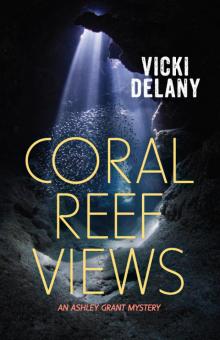 Coral Reef Views
Coral Reef Views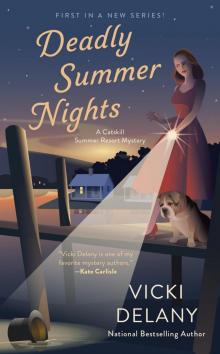 Deadly Summer Nights
Deadly Summer Nights Murder in a Teacup
Murder in a Teacup Whiteout
Whiteout Dying in a Winter Wonderland
Dying in a Winter Wonderland Tea & Treachery
Tea & Treachery Rest Ye Murdered Gentlemen
Rest Ye Murdered Gentlemen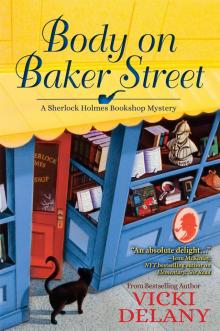 Body on Baker Street: A Sherlock Holmes Bookshop Mystery
Body on Baker Street: A Sherlock Holmes Bookshop Mystery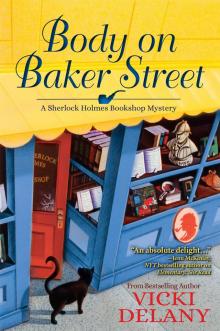 Body on Baker Street
Body on Baker Street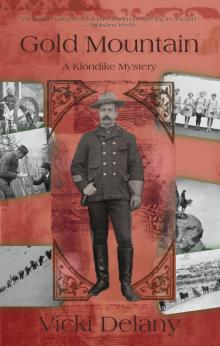 Gold Mountain
Gold Mountain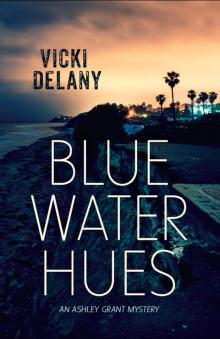 Blue Water Hues
Blue Water Hues Hark the Herald Angels Slay
Hark the Herald Angels Slay Murder at Lost Dog Lake
Murder at Lost Dog Lake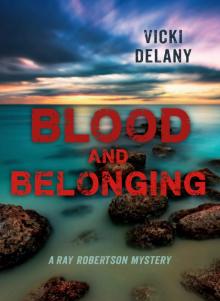 Blood and Belonging
Blood and Belonging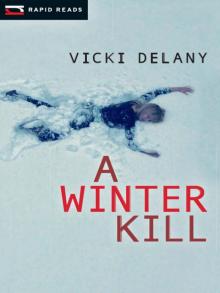 A Winter Kill
A Winter Kill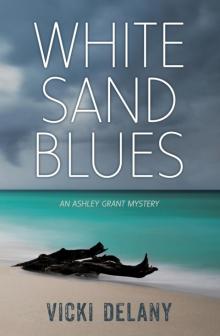 White Sand Blues
White Sand Blues Scare the Light Away
Scare the Light Away Burden of Memory
Burden of Memory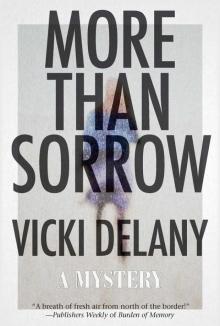 More Than Sorrow
More Than Sorrow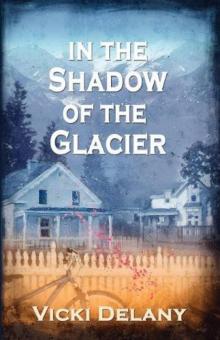 In the Shadow of the Glacier
In the Shadow of the Glacier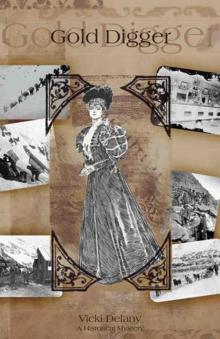 Gold Digger: A Klondike Mystery
Gold Digger: A Klondike Mystery Gold Web
Gold Web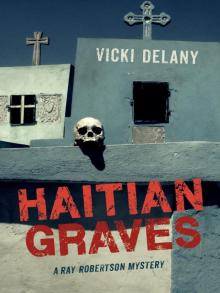 Haitian Graves
Haitian Graves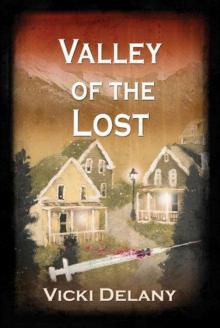 Valley of the Lost
Valley of the Lost We Wish You a Murderous Christmas
We Wish You a Murderous Christmas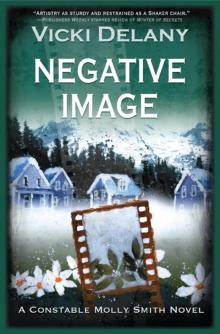 Negative Image
Negative Image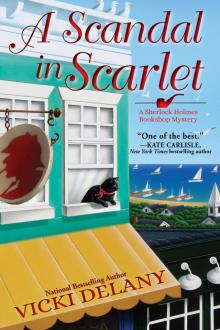 A Scandal in Scarlet
A Scandal in Scarlet Juba Good
Juba Good Winter of Secrets
Winter of Secrets Unreasonable Doubt
Unreasonable Doubt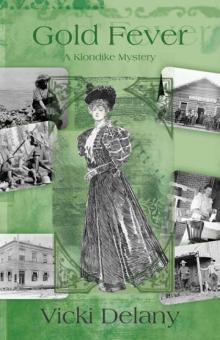 Gold Fever
Gold Fever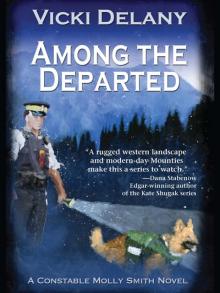 Among the Departed
Among the Departed Elementary, She Read: A Sherlock Holmes Bookshop Mystery
Elementary, She Read: A Sherlock Holmes Bookshop Mystery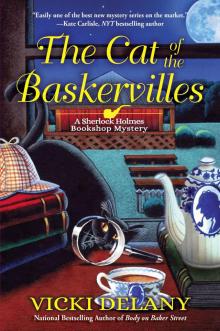 The Cat of the Baskervilles
The Cat of the Baskervilles